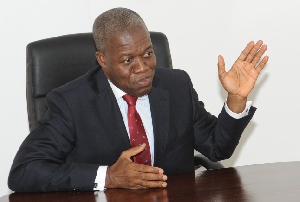Two very contrasting philosophies about presidential term limits in Africa were on display this week at the World Economic Forum (WEF) on Africa in Cape Town, South Africa.
On Thursday South Africa President Jacob Zuma, who is serving his second and last term, told WEF Africa in strong words that Africa as a political bloc should resolve not to allow any attempt by presidents on the continent to seek a third term in office.
“This business of us agreeing to serve two terms, only to realise ten years is too short, is a problem,” Zuma said.
Zuma was supported by Ghana’s Vice President Kwesi Amissah-Arthur, who said the issue of presidential term limits should be raised at the African Union (AU) summit in Johannesburg next week.
The leaders were commenting on the situation in the central African nation of Burundi, which has been again plunged into political crisis over its president Pierre Nkurunziza’s attempt to seek what the opposition and civil society say is an illegal third. Over 20 people have been killed, and more than 550 injured in continuing protests.
Burundi crisis
Last Sunday Zuma joined East African leaders in an emergency meeting in the Tanzanian commercial capital Dar es Salaam on the Burundi crisis. They called on Nkurunziza to postpone elections that were initially scheduled to begin Saturday, until conditions were conducive.
Over 100,000 Burundians have fled the violence that was sparked by Nkurunziza’s power grab, and are now in refugee camps in neighbouring Tanzania, Rwanda and DR Congo.
Amissah-Arthur said “I know that in the ECOWAS there was an attempt to determine a two-term limit for presidents and that may be a solution that will bring an end to this kind of agitation. I know that the AU will be meeting in a couple of days here in Joburg, and that discussion should take place,” Amissah-Arthur said.
Zuma said rising political maturity in post-colonial Africa was seeing citizens become increasingly intolerant of undemocratic leaders.
“In a sense, people are saying ‘enough of strongmen. We are ready to take up our own, whatever, to fight that. Which is a good thing.
“If you take Burundi. Burundi was at peace with itself, but this caused a problem: that the president felt he hasn’t done two terms, he still needs to do that and people believed he had done them”.
Kagame should stay
Later on Thursday, Rwanda’s Finance Minister Claver Gatete offered a view very opposite to Zuma and Amissah-Arthur’s.
Gatete said Rwandan voters want President Paul Kagame to serve a third term and have the power to change the constitution to make this happen.
“The president has not said he wanted a third term, the president has made it very clear that he will follow the law,” Gatete in an interview also at WEF Africa.
“But the people of Rwanda have a say in whoever has to be the leader and also what the constitution should look like.”
Kagame has been in power since 2000 after he led a rebel army that ended the 1994 Rwandan genocide of about 800,000 people.
The country’s parliament said last month it received 2 million signatures calling for a constitutional amendment that would allow Kagame to extend his rule for another seven-year term at elections scheduled for 2017.
Rwanda has a $7.5 billion economy that relies on exports of crops including coffee for most of its foreign-exchange revenue. Starbucks Corp., the world’s largest coffee-shop operator, plans to double its purchases of the country’s output. The East African nation sold $400 million of Eurobonds for the first time in April 2013.
Investor confidence
In neighbouring Burundi, “…it’s the opposite, the leader is saying we want a third term, but some of the people are saying we don’t see it that way,” Gatete said. “Here for us it’s not the president who is saying anything, it’s ordinary people.”
Rwanda and Burundi are part of the East African Community (EAC), which together with Kenya, Uganda and Tanzania form a five- nation trade bloc with a $110 billion economy. Ugandan President Yoweri Museveni, who has ruled Africa’s biggest coffee exporter since 1986, was nominated by an informal resolution of his party last year to be its sole candidate in the elections scheduled for February 2016.
The Uganda parliament scrapped term limits in 2005.
The unrest in Burundi won’t undermine investor sentiment in the region or harm economic growth in Rwanda, where as many as 27,000 refugees have fled, Gatete said.
“This is happening in Burundi, it’s another country,” he said. “What Rwanda is doing can be seen by everyone, in terms of making sure that we do the right things, in terms of promoting the investment.”
Makhtar Diop, the World Bank’s vice president for Africa, is less sanguine. He said the conflict in Burundi may damage investors’ perceptions of the whole continent.
“Situations like the one in Burundi and other countries facing a bit of instability show that progress made in a decade can be offset in a year,” Diop said in an interview in Cape Town on Friday. “This stop-and-go is a most detrimental element to sustainable growth.”
General News of Saturday, 6 June 2015
Source: mgafrica.com

















